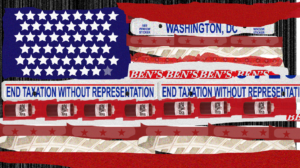In 2009, Voice staffer Will Sommer wrote a piece sharing his and other political writers’ predictions on the next year in D.C. city politics. Ten years later, as the Voice Feature’s editor, I would like to take this opportunity to revisit those predictions and make some new ones for 2020 and the decade following.
When I first moved to D.C. in 2018, I knew very well that I was entering into a city with a rich and storied political history. Visions of presidents clad in stockings and powdered wigs had given way to the vibrant energy of modern congressional politics, buzzing phones, and 24 hour news. While the political side of the city tends to be romanticized beyond recognition, it is clear that the residents of D.C. appreciate living in a city so important to the daily workings of the country.
For those of us who live—and vote—in D.C., myself included, the truly relevant political arena can be found about a block away from the south lawn of the White House. Here, the mayor’s office and city council building towers over Pennsylvania Avenue. Currently occupied by Muriel Bowser, the office critically represents the affairs of District residents. D.C’s past decade, and likely its coming one, tells the story of this office’s constant struggle for recognition in a city that seems to be run by everyone but its own citizens. Will’s predictions centered around this crucial-yet-forgotten office, and so will mine.
So, get ready. All I can promise is my best effort, a little palace intrigue, and a lot of feelings about Congress.
The Mayor
Will’s predictions:
The mayoral campaign will be 2010’s biggest local politics story, as incumbent Mayor Adrian Fenty (D) tries for a second term. Fenty used to be a shoo-in for a second term, but lately he’s methodically antagonized vast numbers of constituents and councilmembers.
City Paper politics columnist Mike DeBonis (COL `04), a former Voice editor, predicts a run by Council Chairman Vincent Gray—resulting in a tight race.“[Gray] will lose by a surprisingly close margin,” DeBonis said.
In the hopes that this column will be forgotten if I’m wrong—and seen as shockingly prescient if I’m right—I’ll go big and say Councilmember Kwame Brown (D-At-Large) will run for mayor and win.
He’ll be put over the top by his fresh face and a motley crew of teachers, good government advocates, and D.C. old guarders like Marion Barry (D-Ward 8), whom Fenty attacked this year.
Since then:
With Fenty pulling a 42 percent approval rating at the beginning of 2010, he was understandably challenged. Though Brown did not enter the race (sorry Will), Gray did, a move that proved fateful for Fenty. Gray won the primary with 53 percent of the vote, resulting in a more definitive victory than DeBonis had even predicted for Fenty. Gray then went on to win the general election with 70 percent of the vote, though over 20 percent of voters wrote in a candidate. Interestingly, write-ins overwhelmingly voted for Fenty.
The details of this 2010 election would darken Gray’s four-year term as a 57-month long investigation by the Justice Department led to a dozen guilty pleas from some of Gray’s closest supporters during the campaign. Prosecutors alleged that Gray knew about the illegal fundraising scheme that contributed to his 2010 election bid. Though Gray himself was never charged, voters spoke volumes when they chose current Mayor Bowser over Gray in the 2014 primary.
Despite this incident, Gray currently sits on the council.
My predictions:
Probably not another campaign finance scandal. The mayoral election in 2022 depends heavily on what Bowser does in the next few years. According to Washington Post polls, only a little over a half of D.C.’s population would like her to run for a third term. She saw no serious challengers in 2018, but was less popular than many other Democrats on the general election ballots.
Bowser is ironically weak on her two signature issues: affordable housing and homelessness.Though she campaigned on increasing affordable housings, voters feel she has not done enough during her term. As the demographic most likely to be affected in both cases, lower income and younger voters already show minimal support for four more years of Bowser.
A strong challenger with a solid platform on housing will bring about a Bowser defeat. Attorney General Karl A. Racine (D) is the most likely candidate, as he considered challenging Bowser last year. Notably, Racine’s AG campaign received the most support of anyone on the ballot in the 2018 election, getting almost 35,000 more votes than Bowser.
It’s also worth noting that voters may be looking to clean house and elect someone new after a decade of scandals. In her first term, Bowser was accused of favoritism in awarding contracts and dealt with a multitude of pubic school scandals. While these issues were not prohibitive to her re-election, things might be different in the current scandal-rich, Evans-dominated environment.
Looking further into the decade at the 2026 mayoral election, I believe it would be a stretch to assume Bowser could pull off a fourth term, so expect a shake-up in this decade at the least.
City laws (and Congressional Oversight)
Will’s predictions:
Whoever is elected mayor next year, they’ll have to grapple with Congress, which has the ability to bring any local legislation to a Congressional vote. The top target for any representative in an election year will be D.C.’s gay marriage law, according to NBC4 reporter Tom Sherwood.
“I would be very surprised if someone in Congress doesn’t try to block that law,” Sherwood said. Personally, I think gay marriage will go quietly into D.C. code, and the Council will pick a new Congressional bugaboo to push: a referendum on medical marijuana.
Since then:
Here, Will was pretty close to reality. Once marriage licenses for same-sex couples began being issued on March 3, 2010, the law faced only two challenges, neither of which were successful. The Senate voted down Utah Sen. Bob Bennett’s attempt to suspend the issuing of licenses until a referendum was called, and a suit brought by a Maryland bishop was found in favor of D.C.
Subsequently, as Will predicted, attention shifted to marijuana law. In 2014, District voters approved Initiative 71, the “Legalization of Possession of Minimal Amounts of Marijuana for Personal Use Initiative.” Republicans responded with an omnibus spending bill to prevent the city from using any of its funds to enact marijuana legislation. As a result, while possession is legal in most cases, the Council has not been able to fully tax or regulate it, creating a semi-underground cannabis market in the district.
My predictions:
As more states legalize marijuana during this decade, the Council will likely revisit the cannabis issue. Currently, up to $20 million could be collected in local tax revenue if the market were regulated and taxed. If there is any opening for a push—i.e. if the Democrats take the Senate—it seems likely the Council will try to get full control over marijuana in the District, and model the new economy after successful state cannabis economies.
It’s not clear to me what the next major issue the city will clash with Congress on, but I’m leaning towards birth control and abortion. As more states rescind pro-choice laws and slash funding for abortion clinics, a powerful coalition of anti-choice Republicans could attempt to do the same in D.C.. House Republicans tried to use a spending bill this past year to limit access to safe abortion for low-income D.C. residents, and I would expect these attempts to continue. If one were to pass, expect an uproar from both residents and councilmembers, who overwhelmingly support safe and legal abortions.
Representation in Congress
Will’s predictions:
Don’t expect the overbearing Congressional review process to end any time soon, though, because D.C. might not be getting a voting representative in Congress next year. Mark Plotkin, a political analyst at radio station WTOP, blamed that on Congresswoman Eleanor Holmes Norton (D-DC), D.C.’s non-voting Congressional representative.
Since then:
Ten years later, Norton is still non-voting, but that does not tell the full story. She was recently named the most effective lawmaker in an academic study, which is even more surprising given her non-voting status. So far in this Congress, she has sponsored 74 pieces of legislation, and co-sponsored over a thousand.
Since 2011, she has worked on over five thousand bills. She was much more active in the past decade was than her first one in Congress, even without a vote.
My predictions:
Norton receiving a vote is no longer the end goal in discussions about representation in Congress—the city has shifted to the possibility of statehood. In 2016, 86 percent of district voters expressed support for D.C. statehood in a city-wide referendum. That was followed in 2019 by the passage of H.R. 1, which included a non-binding expression of support for statehood, and the first House hearing on statehood of this century.
D.C. could become a state with a simple majority vote in both chambers of Congress or an amendment to the Constitution.
As momentum builds, I expect statehood to enter the national conversation more, even if it is not passed in the next decade. There are signs it will become a signature part of the Democratic platform. Currently, twelve 2020 presidential candidates support D.C. statehood, including all of the top four Democrats.
***
So, it seems that Will’s predictions held water (and hopefully mine will too). But one thing he missed was the thread that connects each of these issues—the fight of district residents to be heard without the interference of corruption or Congress.
More than most places, I have found D.C. politics to be ruled by external factors—whether that be the special interests some council-members have all too willingly indulged, or the legislative chambers whose purse includes a special pocket for District residents. Unfortunately, this has served to elevate power struggles while ignoring resident voices.
In October of 2018, the council repealed Initiative 77, a measure that would have increased the minimum wage of tipped workers. Although the initiative received the approval of 55 percent of voters in June 2018, it was opposed by the restaurant industry.
The story of Initiative 77 proves a cautionary tale—it is one thing when the city government fights with the national government, but it is another when it ignores its own people. This decade will show whether this repeal was an isolated event, or the start of a troubling trend.
D.C. has so much to fight for. I can only hope that by 2030, we will have won some of those fights.






